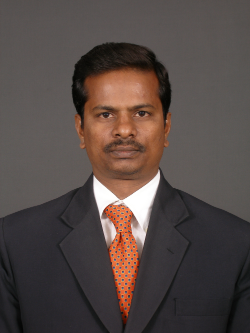.JPG)

It is my pleasure to welcome you to the Department of Nautical Science. Our B.Sc program is designed to provide students with a comprehensive understanding of the principles and practices of navigation, seamanship, and shipboard operations. The program encompasses a wide range of subjects, including Navigation, Cargo Handling and Stowage, Maritime Law and Regulations, Ship Stability, Meteorology, and Marine Communication.Our graduates are highly sought after in the maritime industry and have excelled in a range of careers, including Navigation, Ship Operations, and Marine Surveying.
The BSc in Nautical Science program is an undergraduate degree program that prepares students for a career as a deck officer in the merchant navy or in the maritime industry.The program focuses on providing students with a comprehensive understanding of the fundamental principles of navigation, seamanship, ship stability, marine engineering, and maritime law. Graduates of the program are qualified to work as deck officers on ships of all sizes and types, including cargo vessels, tankers, passenger ships, and offshore vessels.
Candidates must have completed 10+2 with Physics, Chemistry, and Mathematics (PCM) as mandatory subjects from a recognized board. Minimum Marks: a) 60% aggregate marks in PCM b) 50% marks in English subject in 10+2 examination.
Unmarried
For SC/ST candidates: There will be a 5% relaxation in eligibility marks of PCM; however, it will not apply to English Marks.
Relaxation of 5% in English marks will be applicable to candidates who are native of the Lakshadweep and Andaman & Nicobar Islands and belong to recognized Scheduled Tribes of the islands and who & both of whose parents were born in these islands & belong to the Scheduled Tribes of those islands.
Maximum age:
For Male: General-25 years, OBC(NCL)-28 years, SC/ST-30 years
For Female:General-27 years, OBC(NCL)-30 years, SC/ST-32 years.
The reference date for calculation of the age will be from the date of commencement of the Academic Session (01.08.2024) .
Physical Fitness
Candidates seeking admission to this Nautical Science Programme must be medically fit including eye sight and hearing as prescribed in the Merchant Shipping (Medical Examination) Rules, 2000, as amended.
At the time of admission, candidates will be required to produce certificate of medical fitness issued by doctors approved by the Directorate General of Shipping, Mumbai. (Refer: https://www.dgshipping.gov.in/Content/MaritimeHealthBranch.aspx)
Eye sight:
There shall be no evidence of any morbid condition of either eye or of the lids of either eye which may be liable to risk of aggravation or recurrence. Candidates must possess good binocular vision(Fusion faculty and full field of vision in both eyes). Movement of the eyeballs must be full in all directions and the pupils should react normally to light and accommodation. Normal colour vision shall be tested by Ishihara Test Chart. Distance Vision
unaided 1.0*(6/6) in better eye and 0.67*(6/9) in another eye.
Here is the Fee structure for B.Sc. in Nautical Science:
|
Fees Payable by Students for various Programmes in IMU Campuses (Not applicable to Affiliated Institutes) |
||||
|
Residential/ Non Residential |
Total Fees for the Academic Year (Rs.) |
Fee Payable per Semester |
||
|
Odd Semester |
Even Semester |
|||
|
Programme Fee (Rs.) |
Semester Fee (Rs.) |
Semester Fee (Rs.) |
||
|
3-year Residential Programme |
2,75,000 |
30,000/- |
1,22,500/- |
1,22,500/- |
| Semester I | ||
|---|---|---|
| Theory | Practical Laboratories/Workshops | |
| 1 |
Maritime English |
Computer Science Practical |
| 2 |
Mathematics |
Soft Skill Practical(Communication skill) |
| 3 |
Physics |
Field Practice - Swimming Training |
| 4 |
Computer Science |
Book Review (any good book of student's choice, literature, fiction, non-fiction, historic, time travel etc) |
| 5 |
Ship Construction |
|
| Semester II | ||
| Theory | Practical Laboratories/Workshops | |
| 1 |
Nautical Mathematics |
Seamanship Practical |
| 2 |
Nautical Physics and Electronics |
Nautical Physics and Electronics Practical |
| 3 |
Environmental Science |
Field Practice - Industry Visits |
| 4 |
Bridge Equipment and COLREGS |
Communication Skills on Case Studies |
| 5 |
Terrestrial Navigation |
|
| Semester III | ||
| Theory | Practical Laboratories/Workshops | |
| 1 |
Marine Meteorology |
Nav Equipment OOW Simulator Practical |
| 2 |
Bridge Electronic Equipment and Watch Keeping |
Project Work Practical (Making model ship structures / Cargo related / Case Studies) |
| 3 | Ship Stability-I | Field Practice – Planetarium / Light House visit |
| 4 |
Cargo Work I |
Technical Writing Skills on Navigational Subjects |
| 5 |
Celestial Navigation |
|
| Semester IV | ||
| Theory | Practical Laboratories/Workshops | |
| 1 |
Contingency Preparedness |
Chart Work Plotting and ECDIS Simulator Practical |
| 2 |
Marine Pollution Prevention |
Advanced Seamanship Practical |
| 3 |
Artificial Intelligence and Autonomous Ships |
Field Practice-Boat Rowing Exercises |
| 4 |
Cargo Work-II |
Technical Writing skills on Environmental subjects |
| 5 |
Ship Stability-II |
|
| Semester V | ||
| Theory | Practical Laboratories/Workshops | |
| 1 |
Ship Manoeuvring and Piloting |
Engine Room Machinery and Workshop Practical |
| 2 |
Marine Engineering and Automation |
Watch Keeping Practical - I |
| 3 |
Shipboard Operations |
Field Practice - Placement Activities |
| 4 |
IMO and International Conventions |
On-board Record Keeping |
| 5 |
Naval architecture-I |
|
| Semester VI | ||
| 1 |
HR Practices in Shipping |
OOW Simulator Steering and BTM Practical |
| 2 |
Logistics and Supply Chain Management |
Watch Keeping Practical - II |
| 3 |
Blue Economy |
Field Practice - Community Service |
| 4 |
Commercial Shipping Practices |
Maritime Upskilling |
| 5 |
Naval Architecture-II |
|